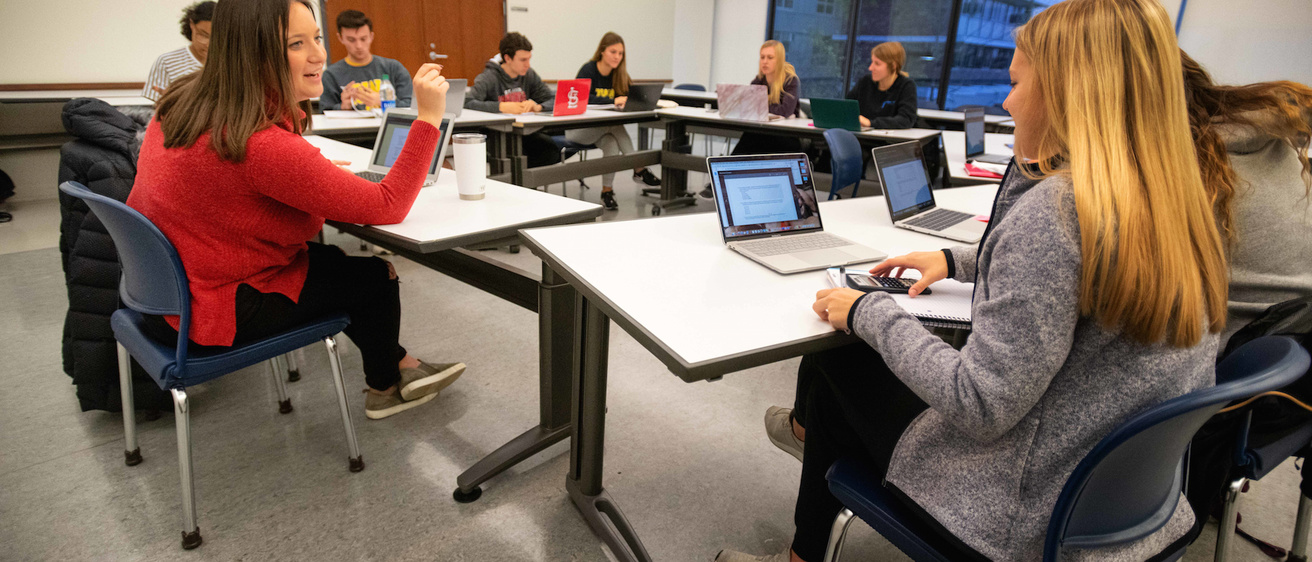When Danielle “DK” Kaplan was a first-year student at the University of Iowa, she envisioned a major in Spanish and secondary education, but decided after taking one education class that she couldn’t imagine herself teaching. She shifted to business, she says, then looked into studying human resource management.
What helped her make a decision—and led her to a successful path that now has her set to graduate in May 2020—was when her advisor asked her questions that Kaplan says “forced me to think about where I’d like to see myself after college, even though I was only a first-year student.”
“She was phenomenal when I came to her shrugging my way through potential majors,” says Kaplan, of Carol Stream, Illinois. “Each time I went to see her, I allowed her to get to know me well enough that she was able to suggest a major that suited my interests and personality. Forming that relationship really helped me decide.”
Kaplan, who decided upon enterprise leadership after working with her advisor, Robyn Falline, is now a fourth-year student conducting research in the Department of Communication Studies. She also is pursuing a minor in Spanish and a certificate in writing—an academic plan that allows her to explore her diverse interests in a way she may not have considered without Falline’s guidance.
Kaplan’s path reflects the experience of many UI students, who discover that the advising process, while perhaps starting as a cursory assigned meeting for selecting courses, can become crucial not only in their college trajectory but in their personal development.
The Academic Advising Center (AAC), which will mark its 40-year anniversary in December, offers one-on-one assistance and a variety of programming to more than 10,000 undergraduates in an average fall semester and an additional 8,300 in the spring.
In a markedly different approach to how undergraduates charted their academic progress before the center was established, advisors guide students in using tools and resources to understand their interests and abilities. This method plays a crucial role in retention, says Lisa Ingram, assistant provost for enrollment services and AAC director.
“As a result of the advising experience, students can learn how to navigate the university to find information and assistance they may need, how to create academic plans and monitor their academic progress, just to name a few of the skills that contribute to their well-being and success in college,” Ingram says.
The AAC serves as a “one-stop shop” for first- and second-year students who often are exploring various academic programs. While each student is assigned to an advisor who specializes in their area of study (if decided), they can also see an advisor-on-call during the busiest periods of fall and spring semesters. Students begin working with their assigned advisor at orientation. If students are struggling academically, advisors reach out to ensure they are aware of resources available to them.
In addition, the AAC has implemented retention-specific programming for first-year students. The College Transition class, for example, includes a seminar that focuses on developing academic skills to succeed in college-level coursework. Another option, Courses in Common, allows first-year students to take two courses together with a group of 20 first-year peers.
But student advising, both at the UI and as a professional field, hasn’t always been so customized. Before 1979—when the AAC was created on a trial basis upon the recommendation of a faculty committee—all students were assigned to faculty for advising, including open and pre-med students who were randomly assigned.
“The quality and consistency of advising was lacking because, while faculty are experts in their discipline, they weren’t well-equipped to help students who were uncertain of their major or having difficulty with the adjustment to the demands of college-level coursework,” Ingram says.
The pilot program, she says, “was a great success.” In its first three years, the center advised only open and pre-med students but over the next eight years took on advising for virtually all first-year students. In recent years, Ingram says, the number of student appointments has steadily increased, with more than 45,000 one-on-one student visits taking place in 2017–18.
An essential part of the UI’s successful advising model is what Ingram calls the “durable” contact that the center’s 38 advisors establish with students—a plan of regular communication that she says plays a big role in retention.
For senior Nick Zanetti, of Cary, Illinois, the consistency and quality of visits with his advisor wasn’t something he expected would play such an important role. He enrolled at UI knowing that he was interested in science and the human body, but was uncertain about his goals. After taking pre-requisite courses for pre-physician assistant and pre-physical therapy, he was “undecided about the whole thing.”
“Initially, I’d really only go to the center to plan my courses for the next semester,” he says. “But my first advisor, Diane Crosby, was so professional and uplifting that she really made me feel good about choosing a career in health care.”
Specifically, Crosby’s guidance led him to visit the Pomerantz Career Center, where he was encouraged to explore his strengths and interests, leading to a meeting with the director of the human physiology program. Zanetti is now a fourth-year human physiology student focusing on cardiac perfusion.
“After talking with the director and following that path, I feel that I’ve found my niche,” Zanetti says. “I have my advisors to thank for guiding me in the right direction.”
